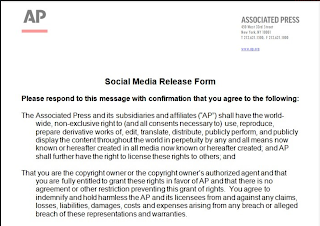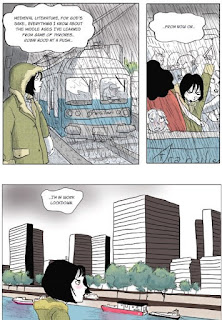Some ground rules: I am a lawyer. I am not your lawyer. This post is intended to provide you with basic information so that you can make informed decisions, including whether to hire a lawyer. This post is NOT legal advice. If you want legal advice you should hire a lawyer.
=====
This is 2020 and it feels like we're getting a decade of news every few hours. We all have phones, and sometimes we get photos and videos of newsworthy events and post them to social media. Sometimes the traditional media sees and wants to use those photos and videos. If that happens, you might find requests from media organizations to use your material.
Whether or not you want to respond to those requests is your choice. And even if they're not offering money (they're probably not), you might decide you want to let them use it anyway. That is totally your call, and I am not writing this to try to influence your decision.
However, you might want to keep one thing in mind: if they didn't think your material had value, they wouldn't be asking to use it.
But some of the requests I've seen lately from media organizations have strings attached. They aren't just asking permission to use the material; they are asking you to agree to terms and conditions. Yes, you read that right. They will ask you to agree to a contract with legal language in exchange for using your material, usually without offering to pay.
If someone wants to use your material and they want you to sign a contract, you should very very strongly consider reaching out to a lawyer for legal advice.
If you are not going to do that, you ABSOLUTELY should READ EVERY WORD of whatever they are asking you. And you should make sure you understand it before you agree.
In the rest of this post, I will provide a VERY BASIC explanation of some of the things you might find in one of the requests. By "very basic" I mean just a plain language explanation of what the clause does. I am not going into detail about how enforceable the terms might be or anything beyond the most simple details. Contact a lawyer for more.
I will use examples that have appeared recently from real news organizations.
Before we start, three quick points:
1. Copyright exists from the moment the photo or video recording is made. Registration is not needed for copyright to exist. If you took the photo or video with your own phone you are very likely to be the owner of the copyright in that photo or video. There are exceptions; they are very rare. Your ownership of the copyright is the reason they are asking for permission before using it.
2. If you own the copyright, you get to decide whether or not to give permission. You can give permission to everyone who asks, you can pick and choose, and you can refuse to give anyone permission. You own the right; it is your choice.
3. If you refuse permission and they use it anyway, call a lawyer as soon as you can and get real advice. They may decide that they can use it under fair use, but they will be taking a big risk by taking that approach.
Let's look at examples.
Sometimes, the news organization will make the request without trying to add additional terms.
Here's one example.
https://twitter.com/wnbcdesk/status/1266892548943097857?s=20
"Hi this is Dominique from WNBC News 4 NY. Hope you're safe! Did you record this video? If so may we have permission to use it on air, across all platforms, and to share with our affiliates with credit to you?"
Even if it's just a tweet, read it carefully - because saying "yes" does a lot more than just let News 4 NY use it on the late local news.
"Did you record this video?" is how they are checking to see if you are the copyright owner. Lying in response to this question is a BAD IDEA.
"May we have permission to use it on air" - this is a request for permission to use the video in their television broadcasts.
"across all platforms" - this gives them permission to use the video on their website, and anywhere else they want.
"share with our affiliates" - that's the rest of the NBC news family, nationwide. All of it, not just the local NY station asking for permission. The "share" part will take place on whatever terms they've agreed amongst themselves. Any money WNBC gets for this won't be shared with you under this license.
"with credit to you" - here, they're at least offering credit. That's not a given. They are not offering money.
Another example:
https://twitter.com/ABC7NYNewsDesk/status/1266887853394591746?s=20
Hi Pierre. This is Eyewitness News. Did you take this video or do you otherwise own all rights to it? Do you agree WABC and its licensees may use, edit & distribute it without restriction in all media per these terms https://7ny.tv/2YEJCI5? If so reply YESThis uses different language, but it does a lot of the same things as the last one. But this one you need to read even more closely.
"Did you take this video or do you otherwise own all rights to it?" - again, lying is bad. Unless you are a professional and really know what you are doing (in which case you're probably not reading this), it would be very risky to assume that you "otherwise own all rights" to videos or photos you did not take.
"Do you agree WABC and its licensees may use..." - this is similar to the "share with our affiliates" from the example above, but it's broader. This gives WABC permission not just to use the video within the ABC family, but also to charge other people to use your work on their terms, without paying you.
"edit" - this, as my English friends say, does what it says on the tin. They want permission from you to show edited versions of your video. They will not be checking with you to get your approval of their edits.
"distribute" - I'm not going to go into the difference between "use" and "distribute" in something this short and informal.
"without restriction in all media" - this is potentially broader than the "across all platforms" thing from the one above. Let's say that ABC later decides to do an archive collection of all the 2020 riot material. They can include it in that without further permission from you (or payment to you). (The "across all platforms" might be broad enough to let them do that too.) (A lot of these tweet-wrap licenses have terms that aren't the kind of thing a lawyer would recommend you agree to because they are so vague. Which is why getting in touch with one before agreeing might not be a terrible idea.)
"per these terms https://7ny.tv/2YEJCI5?" - NEVER EVER EVER EVER EVER EVER agree to something with terms behind a link without clicking and reading EVER. And really start asking yourself "how much do they want me to agree to FOR FREE?"
Here's the link for the click-through, and a screenshot:
https://abc7ny.com/submit-news-videos-photos-to-wabc-tv/5161087/
That's a lot of text to agree to.
short version - in addition to everything that was in the tweet, this also makes it clear that you're not just giving the local station rights, you're giving ABC rights. It makes it clear that they can use your work in their commercials. It makes it clear that they can use your work anywhere in the world. It makes it clear that they can use your work forever. It makes it clear that they will not be paying you. It makes it clear that they are not actually saying they will use it at all.
Also, nowhere in there do they promise to even give you credit.
Oh, and if it turns out that you didn't own the copyright, and the person who does sues them, they can maybe try and use this to go after you for damages.
One final example:
This image is something that the Associated Press tweets at people as part of the permission request.
This is the densest lawyer language of any of them. I am not going to define all of the terms here. I will say this much:
The top paragraph contains everything the other ones contained as far as the rights go, plus way more. Theoretically, if you agree to this and the AP wanted to, they could sell t-shirts with screenshots from your video. Or they could sell someone else a license to do the t-shirts. Or posters. Or whatever. (That's the effect of the "derivative works" language.) And, yes, that's very very unlikely, but not impossible.
The bottom paragraph is you agreeing to pay all the AP's expenses and damages, including their legal bills, if there's later a dispute over whether you owned the copyright. That's the effect of the "indemnify and hold harmless" language.
I would personally never sign a contract with an indemnification clause if I wasn't getting money.
Like the ABC agreement, there's nothing in there that would make them even give you credit.
I have not been able to go into nearly enough detail here, but I hope you see that these agreements give away far more rights than just the right for a news station to put your video on the nightly news. Most of the agreements involve you agreeing to receive no money and them not promising to even give you credit. And some of them involve you incurring financial risk.
I hope, if you've read through to this point, that this convinces you to AT LEAST read these things carefully if you are ever asked to agree to them, and to contact a lawyer - or just say "no" - if you are in any doubt as to whether you want to agree to a lot of terms and conditions in order to give news stations something of value in exchange for nothing.




